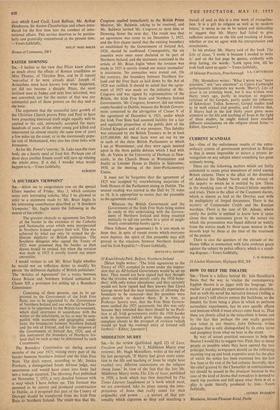HOW TO HELP THE THEATRE
SIR,—There is a fallacy behind Mr. Iain Hamilton's thesis that the way to vitalise the contemporary English theatre is to jigger with the language, 'de- realise' it and generally experiment in every direction. Just as with the novel the narrative interest ('telling a good story') will always remain the backbone, so the theatre, far from being a place in which to perform surrealistic experiments, has its own specific effects and tensions which it must always come back to. That these are closely allied to the naturalistic is borne out by the fact that perhaps the one really genuine new talent in our theatre, John Osborne, writes dialogue that is only distinguished by its extra verve and pungency from what we hear in the street.
By way of actual practical measures to help the theatre I would like to suggest two. First, that as many people as possible when they have opened the two principal Sunday newspapers should on the following morning ring up and book expensive seats for the play of which the notice has been crammed into the last few lines at the end of the last column. Secondly, that the relief granted by the Chancellor in entertainments tax should be passed to the producer because in the case of the kind of drama that nowadays is deemed to merit top position and full space what there is of a play is quite literally produced by him.—Yours faithfully,
GEORGE RICHARDS
Blenheim, Mount Pleasant Road, Poole


































 Previous page
Previous page